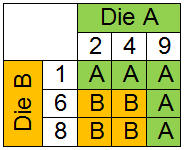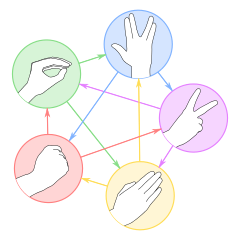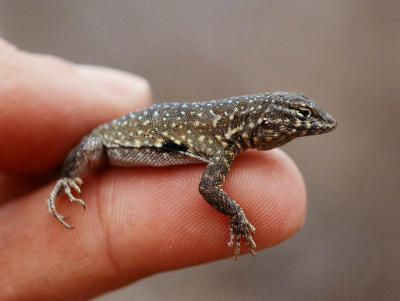We all know it: rock breaks scissors, scissors cuts paper, paper covers rock (… surely a rock could still tear through the paper but we can let that slide). It’s a game where there is no strategy, no skill, just pure randomness: pure fairness.
Sorry: nope. That’s not true.
It is true that if your opponent is playing truly randomly, there is no strategy you can use to gain an advantage. But humans don’t play randomly, even if they try. For example, by analysing a huge amount of data, you find that men are very slightly more likely to pick rock, and women are very slightly more likely to pick scissors Why? Who knows! Think back to The Simpsons: Bart and Lisa decide to play one day. Lisa thinks “Poor predictable Bart: always takes rock”. Bart thinks “Good ol’ rock, nothin’ beats that!”. Guess who wins?
Of course, if the other player has also read this blog, they might decide to play paper, in which case perhaps you should play scissors?
So there is strategy after all
So suddenly, we have a tiny bit of strategy: and it changes based on what sort of strategy your opponent is using!
The idea of “play paper because men play rock more often” breaks down pretty fast if you play several games in a row. Surely your opponent would notice you’re playing paper over and over and over, and eventually start playing scissors, foiling your strategy! What can you do?
Well, there are more cunning tricks you can put up your sleeve. People who’ve just lost a round are likely to play the move that just beat them. Another trick is that people will rarely play the same move 3 times in a row: it feels non-random. So if they play rock twice, you should definitely play scissors next time since they won’t be playing rock.
If you want more ideas, here’s a place to start.
And if you get good, you might be able to compete in an international RPS tournament (I’m not kidding). Check out some of the thrilling action at the 2006 competition in Washington DC.
Non transitive dice
There’s actually a version of rock paper scissors you can play with special dice: a probabilistic version. The idea is that to make 3 dice, carefully choosing the number on each of the 6 faces, so that die A beats die B on average, die B beats die C on average, and (somehow) die C beats die A on average.
This sounds weird right: surely it’s not possible?
Well, here is one choice of dice that has this exact property.
- Die A: 2, 2, 4, 4, 9, 9
- Die B: 1, 1, 6, 6, 8, 8
- Die C: 3, 3, 5, 5, 7, 7
A beats B on average. We can see this by making a table of all the possible outcomes when both dice are rolled.

As you can see, A will win in 5 of the 9 possibilities, and B will win in 4 out of the 9. So on average, A will beat B with a probability of 5/9, or about 56%. You can check yourself that B will defeat C with a probability of 5/9, and that C will defeat A with a probability of 5/9!
Does it have a name?
In mathematics there is an important concept called transitivity. Relationships between objects/things can either be transitive or non-transitive. The best way to explain is with examples:
- The relationship “is taller than” is transitive. If Adam is taller than Beth, and Beth is taller than Charlie, then Adam must be taller than Charlie.
- On the other hand, “loves” is a non-transitive relationship. To shamefully use an analogy from everyone’s “favourite” teen vampire novels: Jacob loves Bella , Bella loves Edward, but this does not mean Jacob loves Edward. Although I bet you could find a piece of fan-fiction where that’s exactly what happens.
So, now you know why we call the dice we just discussed non-transitive dice.
More choices, more fun
 The temptation to add more options is almost irresistible. Sam Kass and Karen Bryla added to more options to create Rock, Paper, Scissors, Lizard, Spock. This game is equally fair as the original, but it’s now less likely for a tie to occur. The diagram of what beats what is on the right, but the explanations are half the fun: Spock smashes scissors, vaporises rock, but is poisoned by lizard and disproved by paper. Lizard eats paper, but is crushed by rock and decapitated by scissors.
The temptation to add more options is almost irresistible. Sam Kass and Karen Bryla added to more options to create Rock, Paper, Scissors, Lizard, Spock. This game is equally fair as the original, but it’s now less likely for a tie to occur. The diagram of what beats what is on the right, but the explanations are half the fun: Spock smashes scissors, vaporises rock, but is poisoned by lizard and disproved by paper. Lizard eats paper, but is crushed by rock and decapitated by scissors.
David C. Lovelace has even taken it to ridiculous extremes, creating RPS 101, with 101 different choices. These include chainsaw, tornado, medusa, UFO, beer, toilet, turnip and many more. You would have to try very hard to remember what beats what, so he created a handy poster.
There are versions which have some options more likely to win against a random move. For example, you could add the “water” or “well” option. This one defeats paper (makes it soggy) and scissors (makes them rusty) but is defeated by rock (splashes the water away). Rock and water can beat 2 others, while scissors and paper can only beat one. If you were playing a random opponent, the clear choice is to always play rock or water. But against a non-random human opponent, it’s tricker. Perhaps they’ll assume you’ll go with rock or water, in which case they might play rock (to win or tie against you). So maybe you should play paper…
Lizards play the game
The rock paper scissors idea of A beats B, B beats C and C beats A is not just a game. The same phenomenon exists in nature too!
 The common side-blotched lizard (Uta stansburiana) has males that come with 3 distinct colourings, and each type also exhibits a certain mating behaviour.
The common side-blotched lizard (Uta stansburiana) has males that come with 3 distinct colourings, and each type also exhibits a certain mating behaviour.
- First, there are the orange-throated ones. These are larger, more aggressive and have large territories. They keep a harem of females.
- Second there are the blue-throated ones. They are medium sized, and only keep one female.
- Thirdly, there are the yellow-throated ones. They don’t have territories at all, and don’t have their own females. Instead, they sneak into other males’ territories and get up to no good with their females instead. Luckily, they know how to trick the male into thinking they are an uninterested female if he comes close, so they can get away with it!
So where does the rock paper scissors come in? Well, Orange males are very good (being aggressive) at stealing the females of the Blue males. Blue males are better at catching the Yellow males because they only have one female to protect. And Yellow males are better at sneaking in a bit of hanky panky with the Orange male’s harem, as he has trouble keeping an eye on all of them.
So, Orange beats Blue beats Yellow beats Orange!
Judges play the game too
Do you ever get the feeling that courts get filled with pointless arguments that are a waste of everyone’s time? Well you’re not alone: Judge Gregory Presnell felt the same about a particular case he was presiding over. The lawyers argued for such a long time over a trivial matter (where should a deposition from a witness be taken?) that he eventually ordered them to play a game of rock paper scissors on the steps of the courthouse to decide.
The best player in the world
Now to the ultimate rock scissors paper player: a robot with a 100% win rate. What is its secret?
A high speed camera identifies what shape a person is in the process of making with their hand as they swing their arm down, and chooses the weapon which would beat it! Watch this video of it in action, proving once again that robots are better than humans.
The featured image is a combination of three images from Brett Coulstock, Dan Taylr, and Zechariah Judy, all under a Creative Commons Licence.
The diagram of rock paper scissors lizard spock was created by Nojhan, and is borrowed under a Creative Commons Licence.
The photo of the lizard is borrowed and edited from Pierre Fidenci under a Creative Commons Licence.